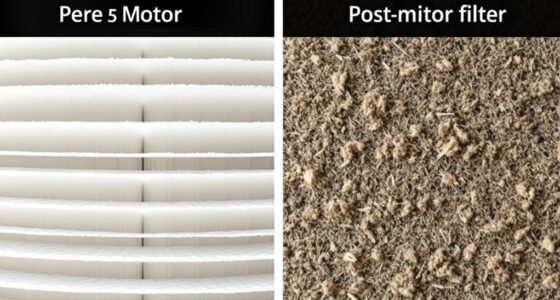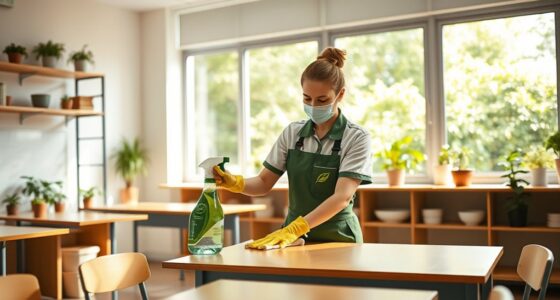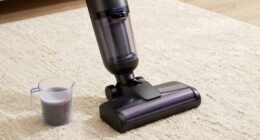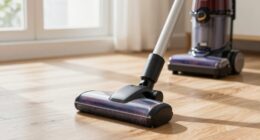When choosing biodegradable sponges and dish brushes, go for options made from natural, renewable materials like bamboo, coconut fibers, or cellulose. Avoid synthetic plastics and look for certifications like FSC or Green Seal to guarantee environmental responsibility. Rinse and air-dry your tools to extend their lifespan, and consider composting them when they’re worn out. Switching to eco-friendly cleaning tools supports waste reduction, and if you keep exploring, you’ll discover even more sustainable habits to adopt.
Key Takeaways
- Look for products made from natural, renewable fibers like cellulose, bamboo, or coconut husk for biodegradability.
- Check for eco-certifications such as FSC or Green Seal to ensure sustainable and responsible sourcing.
- Prefer tools free from synthetic dyes and chemicals to minimize waterway pollution.
- Rinse and air-dry sponges and brushes after use to extend lifespan and promote eco-friendly disposal.
- Choose biodegradable options to reduce plastic waste, support environmental health, and encourage sustainable practices.

Switching to biodegradable sponges and dish brushes is a simple yet impactful way to reduce your environmental footprint. When you choose these eco-friendly cleaning tools, you’re making a conscious decision to support sustainable material options that are better for the planet. Unlike conventional synthetic sponges, which often contain plastics and chemicals that linger in landfills for hundreds of years, biodegradable options break down naturally and quickly, minimizing waste and pollution. By opting for products made from plant-based fibers like cellulose, bamboo, or coconut husk, you align your cleaning routine with eco-friendly cleaning techniques that prioritize reducing harmful impacts.
Switch to biodegradable sponges and brushes to reduce waste and support eco-friendly cleaning.
Sustainable material options are essential when selecting biodegradable sponges and dish brushes. Look for products crafted from natural, renewable resources, which not only guarantee biodegradability but also promote responsible harvesting. Bamboo, for example, is a fast-growing plant that requires minimal water and no pesticides, making it an excellent choice for eco-conscious consumers. Coconut fibers are durable and naturally antimicrobial, providing an effective cleaning surface without relying on synthetic materials. These sustainable options help you cut down on waste and decrease dependency on petroleum-based plastics, which are a significant contributor to environmental pollution.
Incorporating eco friendly cleaning techniques into your routine is easier than you might think. When you switch to biodegradable sponges and brushes, you’re already taking a step toward greener practices. Remember to rinse and air-dry your tools after use to extend their lifespan, reducing the frequency of replacements. Compost your biodegradable sponges once they wear out, ensuring they return to the earth without leaving harmful residues. Additionally, choose products free from dyes and synthetic chemicals, which can leach into waterways during washing. Using natural cleaning agents, like vinegar or baking soda, complements your eco-friendly tools and enhances your sustainability efforts.
Making this switch doesn’t require a complete overhaul of your cleaning routine. It’s about making smarter, more conscious choices that align with your values. You can also look for certifications like FSC or Green Seal, which verify that products meet strict environmental standards. By doing so, you support companies committed to sustainability and responsible manufacturing. Incorporating biodegradable materials into your cleaning routine is an effective way to reduce waste and lessen your impact on the environment over time. Over time, these small but meaningful changes add up, reducing your carbon footprint and encouraging others to follow suit.
In essence, choosing biodegradable sponges and dish brushes empowers you to practice environmentally responsible cleaning techniques. It’s a simple step that leverages sustainable material options and eco-friendly practices to make your daily chores more sustainable. Every time you replace a synthetic sponge with a biodegradable one, you’re contributing to a healthier planet, one cleaning session at a time.
Frequently Asked Questions
Are Biodegradable Sponges as Durable as Synthetic Ones?
Biodegradable sponges can be just as durable as synthetic ones if you choose high-quality options. While synthetic sponges often boast synthetic durability, biodegradable alternatives made from natural fibers may wear out faster with frequent use. However, they’re easier to maintain eco-friendly, as they decompose naturally. To maximize their lifespan, clean them properly and let them dry thoroughly after each use. With proper eco-friendly maintenance, biodegradable sponges can serve you well without sacrificing durability.
How Do Biodegradable Sponges Biodegrade in Different Environments?
Think of your biodegradable sponge as a hero returning to nature’s embrace. In marine environments, it faces faster degradation through marine degradation, breaking down into harmless elements. In composting, it transforms through a natural composting process, enriching the soil. Your sponge’s journey depends on these environments, but ultimately, it peacefully reenters the cycle, unlike synthetic counterparts that linger and harm ecosystems.
Can Biodegradable Dish Brushes Handle Heavy-Duty Cleaning?
Biodegradable dish brushes can handle heavy-duty cleaning, but their kitchen durability depends on the material. Look for brushes with sturdy, natural fibers that resist abrasive cleaning without breaking down quickly. While they may not last as long as synthetic options, they’re eco-friendly and effective for scrubbing stubborn grime. Keep in mind, proper care extends their lifespan, so avoid excessive pressure to maintain their durability during tough kitchen chores.
Are Biodegradable Sponges Safe for All Skin Types?
Biodegradable sponges are generally safe for all skin types, but if you have sensitive skin or allergy risks, you should check the material. Look for sponges made from natural, hypoallergenic materials like cellulose or plant fibers. If you notice irritation or allergic reactions, stop using them and consult a dermatologist. Always test a small area first to verify your skin tolerates the sponge, especially if you have skin sensitivity.
What Is the Typical Lifespan of a Biodegradable Sponge or Brush?
Think of your biodegradable sponge like a delicate garden plant—expect it to thrive for about 2 to 4 weeks with proper care. Its lifespan depends on factors like usage and storage, just as eco friendly packaging protects products. Natural antimicrobial agents help extend its life by preventing bacteria buildup. To get the most out of it, rinse thoroughly after use and keep it dry, ensuring it remains effective longer.
Conclusion
So, next time you reach for that plastic sponge, remember you’re basically giving Mother Earth a big, messy high-five. Switch to biodegradable options and feel like a hero—until you realize you’re just delaying the inevitable plastic apocalypse. But hey, at least your dishes will be squeaky clean, and your conscience, slightly less stained. Because nothing says eco-friendly like pretending your sponge is saving the planet—one scrub at a time.









